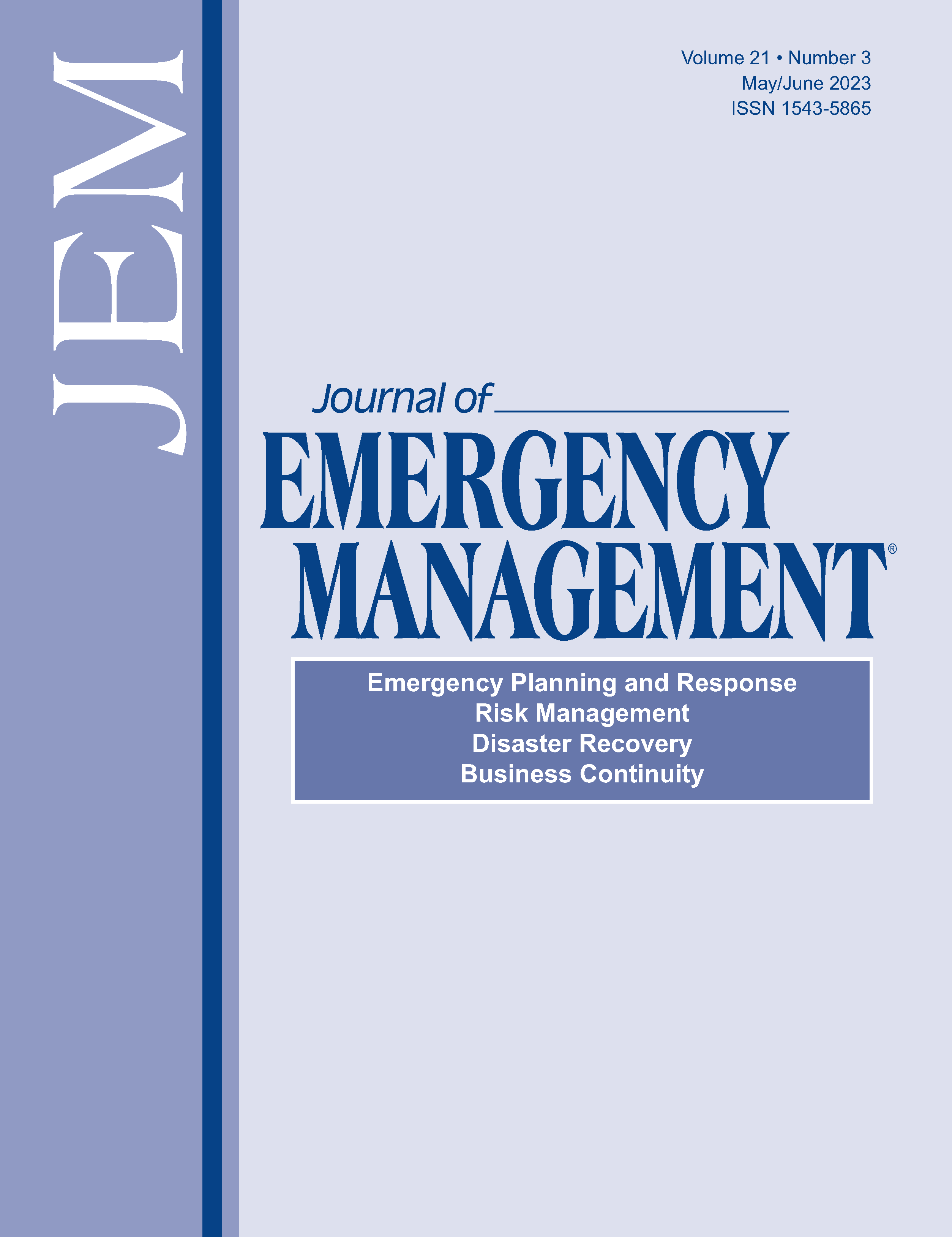First responders, mental health, dispatch coding, COVID-19: Crisis within a crisis
DOI:
https://doi.org/10.5055/jem.0664Keywords:
mental health, first responders, dispatch codingAbstract
Community members experiencing mental health challenges often call 911. On one hand, mental health challenges among community members have grown exponentially during the coronavirus disease 2019 (COVID-19) pandemic. On the other hand, pressure on first responders has increased the complexity of emergency response due to the following reasons: responders not being trained in mental health, difficulties in properly identifying mental health calls, and discrepancies within police coding systems themselves. Consequently, mental health calls may not be addressed appropriately in a community. Understanding how first responders address 911 mental health crisis calls provides a foundation for improvement. A review of the literature illustrates the nature of responses from 911 to end disposition. The analysis highlights the challenges related to identifying mental health calls, matching appropriate responses, and targeting changes that could increase identification accuracy and speed. Based on the literature review, we are proposing a framework for training and research.
References
Lamb R, Weinberger L, DeCuir W: The police and mental health. Psychiatric Services 53. 2014; 10: 1266-71 Available at DOI:10.1176/appi.ps.53.10.1266.
Neusteter SR, Mapolski M, Khogali M, et al.: The 911 Call Processing System. New York: Vera Institute of Justice, 2019. Available at https://www.vera.org/publications/911-call-processing-system-review-of-policing-literature. Accessed April 23, 2020.
Czeisler MÉ, Lane RI, Petrosky E, et al.: Mental health, substance use, and suicidal ideation during the COVID-19 pandemic — United States, June 24-30, 2020. MMWR Morb Mortal Wkly Rep. 2020; 69: 1049-1057. DOI:10.15585/mmwr.mm6932a1.
Abbott A: COVID’s mental-health toll: How scientists are tracking a surge in depression. Nature. 2021; 590: 194-195. DOI:10.1038/d41586-021-00175-z.
FCC: Implementation of the National Suicide Hotline Improvement Act of 2018. Washington, DC: Federal Communications Commission, 2020. Available at https://www.federalregister.gov/documents/2020/09/16/2020-16908/implementation-of-thenational-suicide-hotline-improvement-act-of-2018. Accessed March 25, 2021.
Hofman M, Sokhieng A: The Politics of Fear Médecins Sans Frontières and the West African Ebola Epidemic. Oxford University Press, New York, NY. 2017.
Taylor S: The Psychology of Pandemics Preparing for the Next Global Outbreak of Infectious Disease. Cambridge Scholars Publishing, Cambridge, UK. 2019.
McDonell W, Nelson D, Schunk J: Should we fear “flu fear” itself? Effects of H1N1 influenza fear on ED use. Am J Emerg Med. 2012; 30: 275-282. DOI:10.1016/j.ajem.2010.11.027.
IAED: The global standard of excellence for emergency dispatching. 2021. Available at https://www.emergencydispatch.org/home. Accessed February 4, 2021.
Bohrman C, Wilson A, Watson A, et al.: How police officers assess for mental illnesses. Vict Offenders. 2018; 13: 1077-1092. DOI:10.1080/15564886.2018.1504844.
Cook SC, Schwartz AC, Kaslow NJ: Evidence-based psychotherapy: Advantages and challenges. Neurotherapeutics. 2017; 14: 537-545. DOI:10.1007/s13311-017-0549-4.
Rebecca Maindonald, Chris Attoe, Melanie Gasston-Hales, et al.: Mental health crisis training for non-mental health professionals. J Ment Health Train Educ Pract. 2020; 15: 223-235. DOI:10.1108/JMHTEP-11-2019-0062.
White C, Weisburd D, Comartin EB, et al.: Mental health crisis location and police transportation decisions: The impact of crisis intervention team training on crisis center utilization. J Contemp Crim Justice. 2019; 35: 241-260. DOI:10.1177/1043986219836595.
Houston Police Department: Crisis Call Diversion Program (CCD). 2017. Available at https://www.houstoncit.org/ccd/. Accessed February 4, 2021.
Morabito MS, Savage J, Sneider L, et al.: Police response to people with mental illnesses in a major U.S. city: The Boston experience with the co-responder model. Vict Offenders. 2018; 13: 1093-1105. DOI:10.1080/15564886.2018.1514340.
Puntis S, Perfect D, Kirubarajan A, et al.: A systematic review of co-responder models of police mental health “street” triage. BMC Psychiatry. 2018; 18: 256. DOI:10.1186/s12888-018-1836-2.
Global Law Enforcement Support Section Crime Statistics Management Unit: National Incident-Based Reporting System Technical Specification. Washington, DC: US Department of Justice, Criminal Justice Information Services Division, 2020.
Chatterjee R: New law creates 988 hotline for mental health emergencies. NPR. 2020. Available at https://www.npr.org/sections/health-shots/2020/10/19/925447354/new-law-creates-988-hotline-for-mental-health-emergencies. Accessed January 28, 2021.
Published
How to Cite
Issue
Section
License
Copyright 2007-2025, Weston Medical Publishing, LLC and Journal of Emergency Management. All Rights Reserved.






